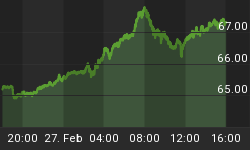The following article was presented for the benefit of subscribers on 08-04-15. So far the HUI turn date of Monday April 13thish was a few days late, but appears to be on course. The XOI and USD index also are playing out according to their respective Elliott Wave patterns. Analysis below discusses what to expect in the S&P over the course of the next few months. One side note, we have implemented all charts on our site going forward to be HTML coded so that a much larger version is available at the click of a mouse.
Although the S&P may seem to be going to hell in a hand basket, that event is not likely to happen until around June/early July. Lower Bollinger bands are in closer proximity, suggestive a bottom has been put in place. Upper Bollinger bands are starting to curl over, suggestive further basing is required for another 5-10 trading days before the present consolidation pattern is complete. Fibonacci time extensions of various waves are shown near the lower portion of the chart, with a cluster of Fib dates occurring on May 6th. Short-term stochastics have the %K beneath the %D, confirming another 5-10 days of market weakness potential before a bottom is put in.
Figure 1
Blue lines on the right hand side represent Fibonacci price retracements of various upward trending waves. Areas of line overlap form Fib clusters, which indicate important support/resistance levels. Moving averages are in bearish alignment (200 day MA above the 155 day MA above the 50 day MA), with the 50 day MA acting as resistance at 1351. Full stochastics have the %K above the %D with the potential for another 6-8 weeks in the present upward trend before topping out. A circle is drawn (I care not to mention how long it took me to get the positioning I wanted) to illustrate a basing pattern that has a definitive curved bottom. If the trend persists, then the %K topping out around early to mid June is highly probable.
Figure 2
The weekly semi-log chart of the S&P 500 Index is shown below, with Fibonacci time extensions of wave a and [W].b shown at the top of the chart. There is a cluster of Fib dates occurring around the end of October 2009, which signifies the expected termination point of wave [X].b (the present corrective structure underway). Blue lines on the right hand side represent Fibonacci price retracements of the move from the 2000 top until mid 2002. Notice how the S&P has moved within Fib channels since mid 2003. Presently, the 1368 level has been serving as resistance...a move above will confirm a corrective grind higher to 1420-1440 before topping out. The upper 55 MA Bollinger band is starting to curl down, suggestive a short-term bottom is in place/still forming. Lower Bollinger bands are in close proximity, suggestive another 2-3 months are required to get enough separation between them to trigger the next decline (contraction in volatility). Full stochastics have the %K beneath the %D, with no indication that a bottom is in place on the longer-term trends. Expect the lower stochastics to have a positive divergence before the 2009 year end low occurs.
Figure 3
The mid-term Elliott Wave chart of the S&P 500 Index is shown below, with the thought pattern forming denoted in green. Expect the S&P to continue chopping sideways over the course of the next 2-4 weeks, before grinding above the 1368 level.
Figure 4
The long-term Elliott Wave chart of the S&P 500 Index is shown below, with the though pattern denoted in green. The S&P is likely to form a top around 1420-1440 at some point between June and July, followed by a decline into October, a post-election US bounce, followed by a resumption to the downside that should bottom around late January 2009 between 1050-1150.
Figure 5
The volume put-call ratio of the S&P 500 Index (finally got this data back on-line). There was a recent spike high in the put call ratio, suggestive a bottom was put in place, which coincided with the %K crossing beneath the %D. The next stock market top should coincide with the %K crossing above the %D, which lies at least 6-8 weeks into the future.
Figure 6
A major portion of the work I do is technically oriented, but I am starting to write 2-3 editorials per week. For further viewing of prior work, simply click on the Archive section of this site. I update the AMEX Gold BUGS Index, AMEX Oil Index, US Dollar Index, 10-Year US Treasury Index, S&P 500 Index as well as commentary on market-related issues and new technical analysis findings. We follow some 60 stocks, with a focus on core positions and stocks that actually make up our personal portfolio. As well, the keeper of the site, Captain Hook writes 3-4 articles per week discussing macro issues, ratio analysis of various markets and an in-depth study of put/call ratios and shorting candidates.
Have a good day.















